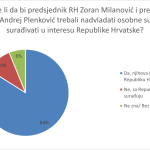ZAGREB, January 1, 2019 – The Croatian Chamber of Commerce (HGK) expects Croatia’s economy to continue rising in 2019 on the back of accelerated implementation of the necessary reforms. Still, the pace of economic growth should be accelerated.
“It is essential to ensure the continuation of fiscal consolidation and discipline that has already brought about benefits and stabilised public finances, thus helping to improve the country’s credit rating,” the HGK said.
A well-balanced budget enables certain tax breaks, which is an additional positive impulse to the economy, the chamber says.
The projection of the state budget’s revenues is based on a realistic projection of an economic growth rate of 2.9%, however, the calculations and plans could be marred by guarantees issued for shipyards’ borrowing, the HGK warns.
The HGK also finds it worrisome that the planned public debt to GDP ratio of more than 70% places Croatia above the average across the European Union.
The chamber also warns that a portion of state consumption in GDP is higher than this ratio in Croatia’s peers, and this segment requires changes.
“It is of exceptional importance to systematically work on the diversification of our economy. Our dependence on tourism, a volatile industrial branch, gives rise for concern. We need other stable branches, a strong IT sector, increasing exports as well as more and more investments in research and development. We must absolutely facilitate the efforts of our entrepreneurs to do business here, and digitisation is crucial.”
The HGK warns about labour shortages, which could be offset in the short term by higher quotas of foreign workers but in the long run, this issue could be coped with only by a reformed educational system.
Croatian Employers’ Association (HUP) president Gordana Deranja has told Hina that employers insist on the implementation of reforms in 2019 so that they can have higher disposable incomes.
HUP keeps warning that in terms of resolution of key issues and implementation of in-depth reforms, Croatia fares worst even among countries of the so-called New Europe. This primarily refers to the burden on the enterprise sector and problems facing the labour market, the healthcare system, education and the pension system as well as the judiciary.
Our hesitation in launching substantial reforms hinders a higher growth, and rates between 2.5% and 2.9% place us together with Bulgaria at the bottom of the EU rankings, says Deranja.
More news on Croatia’s economic growth can be found in our Business section.








